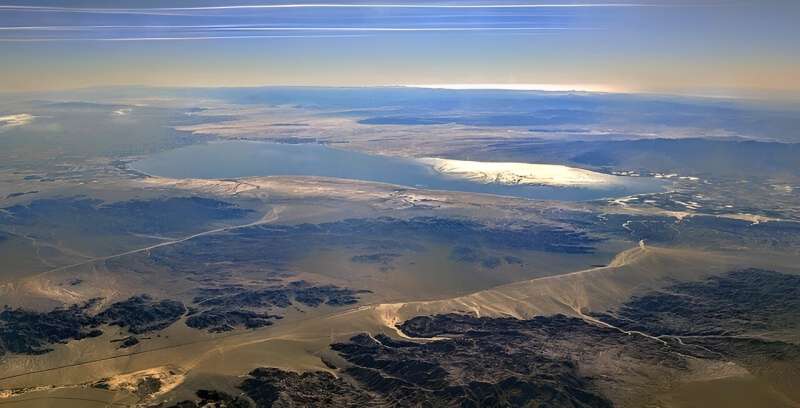This article has been reviewed according to Science X's editorial process and policies. Editors have highlighted the following attributes while ensuring the content's credibility:
fact-checked
reputable news agency
proofread
Southern California's Salton Sea is now smelly all year long and making people's asthma worse: The culprit? Bacteria

The air quality is notoriously bad near the Salton Sea. As California's largest lake has continued to evaporate, it's become saltier and dustier, causing breathing problems for locals like Clark. Alongside the health problems is what she describes as a "putrid dead smell" emanating constantly from the water.
A study by the University of California, Riverside shows that the Salton Sea's rotting odors have become a yearlong nuisance for residents in cities near the lake. The South Coast Air Quality Management District recently issued another odor advisory for parts of the Coachella Valley just north of the Salton Sea, a warning that covered the last six days.
Why does the Salton Sea smell so bad?
Several factors have contributed to this persistent stink, said Caroline Hung, a doctoral candidate and researcher in the Lyons Biogeochemistry Lab at UC Riverside.
For starters, the Salton Sea is very polluted, Hung said. "It's a terminal lake, which means things go in, but they don't come out."
Agricultural runoff from nearby farms deposits fertilizer in the lake, causing algae to bloom rapidly in a process called eutrophication. When the algae decays, it consumes oxygen, making the lake hypoxic—a dead zone without oxygen to support marine life.
The nuisance of the rotten-egg smell is a byproduct of bacteria producing hydrogen sulfide during decomposition. Usually, thermal layers of the lake trap those odors beneath the surface, Hung said, and residents in the Coachella Valley would smell the lake only during hot summer days.
But in recent years, the lake has become shallower, dropping more than 10 feet in the last 20 years, which has caused those layers to mix more often and the hydrogen sulfide scent to permeate the area year-long.
Is the stink dangerous? No and yes
Fortunately, the stink itself is not a toxin, said Scott Epstein, who oversees air quality assessments for the Southern Coast Air Quality Monitoring District. "Hydrogen sulfide exposure is a bit more of a nuisance in that it can cause headaches or nausea, but we don't expect it to cause any sort of long-term health effects," Epstein said.
But researchers have found that there is still something in the dust that is causing higher rates of asthma among people living near the Salton Sea. Dr. David Lo, director of UC Riverside's Bridging Regional Ecology, Aerosolized Toxins, and Health Effects Center, said the culprit isn't actually the chemicals in agricultural runoff.
"The major toxic effect is coming from these bacterial toxins that we are seeing in the dust," Lo said. "Things like heavy metals and pesticides may be a concern, but they aren't really at high enough levels where their levels in the dust are going to cause disease."
As the Salton Sea has become a fertilized petri dish, the prevailing winds have pushed aerosolized bacteria south to communities in the Imperial Valley where people have complained of respiratory issues.
It's less clear if the air quality of the lake has affected local wildlife. There simply aren't enough studies, said Jonathan Shore, manager at the Sonny Bono Salton Sea National Wildlife Refuge.
But we do know that the Salton Sea's bacteria have also killed the lake's fish by depleting its oxygen and increasing its salinity. In 1999, The Los Angeles Times reported that as many as 8 million fish were dying per day and that the native tilapia population in the Salton Sea was nearly wiped out.
"When there was a vibrant fish population in the sea, you would see a lot of pelicans and cormorants and other fish-eating birds," Shore said. "Many of those are not around the Salton Sea anymore."
Are there any solutions?
A state panel rejected a plan in 2022 to revitalize the Salton Sea by infusing the lake with desalinated ocean water, and residents—many of them from low-income and marginalized communities—have been left in limbo.
But Hung said she has some hope that the lithium deposits, a mile below the Salton Sea, could be the key to revitalizing the lake. Silicon Valley industries have already begun flocking to the lake for the precious mineral that is essential for the batteries in electric vehicles.
As the lithium draws a new wave of workers into the area, they'll quickly discover that "it's just not a pretty place to live," Hung said. "It puts the Salton Sea environmental issues in the spotlight."
In the meantime, Epstein advises residents to check air quality regularly through the AQMD website and suggests that they follow best practices when pollution is particularly bad.
"Staying inside with your windows and doors closed, minimizing heavy outdoor exertion, potentially wearing an N-95 mask if you have to be outside, running an air purifier or an air conditioner can all help reduce exposure," Epstein said.
2024 Los Angeles Times. Distributed by Tribune Content Agency, LLC.




















